Daphne Hamilton of North West says, “when we wake up in the morning it is to the sounds of birds and a view of the northern slopes of the Magaliesberg.
“We try to lead green lives by using solar geysers, using solar panels to generate electricity (I live in hope for when we can feed back into the grid), growing a fair amount of our own fruit and vegetables, processing some of it and giving away what we can’t use, using only organic fertilisers or pesticides, and having our own bees.
“Although we try, we are by no means ‘there’. Or even anywhere close. We do our bit; it makes me feel better. Perhaps we are, quite simply, just country bumpkins. Have you heard of Linda Woodrow? It would be a real achievement to be able to emulate her lifestyle.”
Emmie Bedeker, who grew up in the Karoo and now lives in Damaraland in the northwest of Namibia, said, “we have always lived very close to nature and that helps us to realise how important it is to take responsibility for nature.
 The Bedeker’s garden wall, built using a mould. ‘Inside the mould we use wine bottles to take up the space so that we use the minimum cement,’ explained Bedeker. (Photo: Emmie Bedeker)
The Bedeker’s garden wall, built using a mould. ‘Inside the mould we use wine bottles to take up the space so that we use the minimum cement,’ explained Bedeker. (Photo: Emmie Bedeker)
“No matter how much money you have, you cannot buy water or a clean river or ocean when it is all gone. Perhaps you can afford something, but do you really need it? We think twice before we buy anything.”
Samantha Choles, who started a volunteer organisation that does park and pavement clean-ups said, “I’ve always sought to be involved in my community and it’s something my parents instilled in me from early on. That awareness is heightened when you have children of your own and you want them to live in a world that has a clean future.”
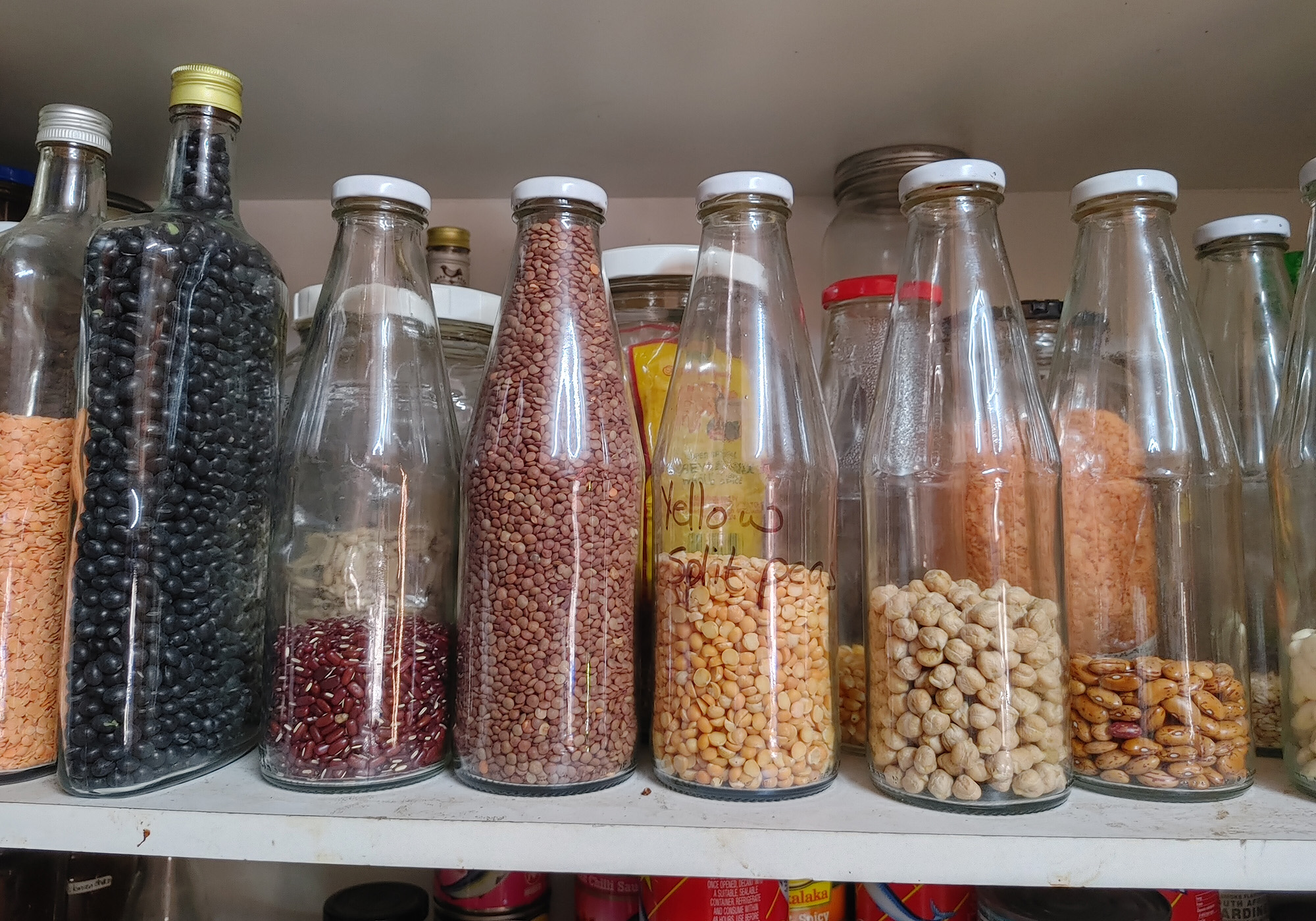 Tomato sauce and sherry bottles that Lesley-Ann Jacobs repurposed. (Photo: Lesley-Ann Jacobs)
Tomato sauce and sherry bottles that Lesley-Ann Jacobs repurposed. (Photo: Lesley-Ann Jacobs)
Lesley-Ann Jacobs, who worked as a dietitian in the military and tries to live as close to a zero-waste lifestyle as possible, said, “I believe that every little bit counts and small efforts accumulate.”
Here are the little bits these readers and others have been doing to try to live sustainably and preserve the planet.
Energy
Like the Hamiltons, Wilna and Chris Campbell of Polokwane use solar power to heat their water.
“We have one solar panel on our roof which supplies electricity to our geyser,” said Chris. “This has already paid for itself, considering the saving on our electrical bill.”
Jacobs said that in an effort to lower electricity consumption she uses a ‘wonder bag’, “or my homemade version — wrap a pot of boiling hot food in a towel and then a blanket to slow cook with residual heat,” explained Jacobs. “Works every time if done correctly. I also use a slow cooker for legumes, chicken and stews.”
Doreen Musson says she conserves energy by cooking only once a week and reheating meals in the microwave. “I’m not sure about the health benefits of such meals but it may make Eskom more viable!”
Peter Klemp, who moved to Claremont in Cape Town after living in Kimberley for 67 years, renovated his new home to be more sustainable.
Klemp installed double glazing in his large north-facing house and created his own air conditioner that uses no electricity. Air is led into the house via a 75mm pipe buried next to the foundations and is pulled in by two vents high on the inside walls just below the ceiling.
Klemp says that as a result, the average temperature of the house is 21˚C in summer and that he pays only R400 a month for electricity.
Klemp also has a solar geyser at 60˚C to catch the low winter sun, makes use of LED globes in the house and uses a gas stove.
Water
Hamilton waters her lawn with water from the washing machine and bathroom and has 90% indigenous and waterwise plants in the garden.
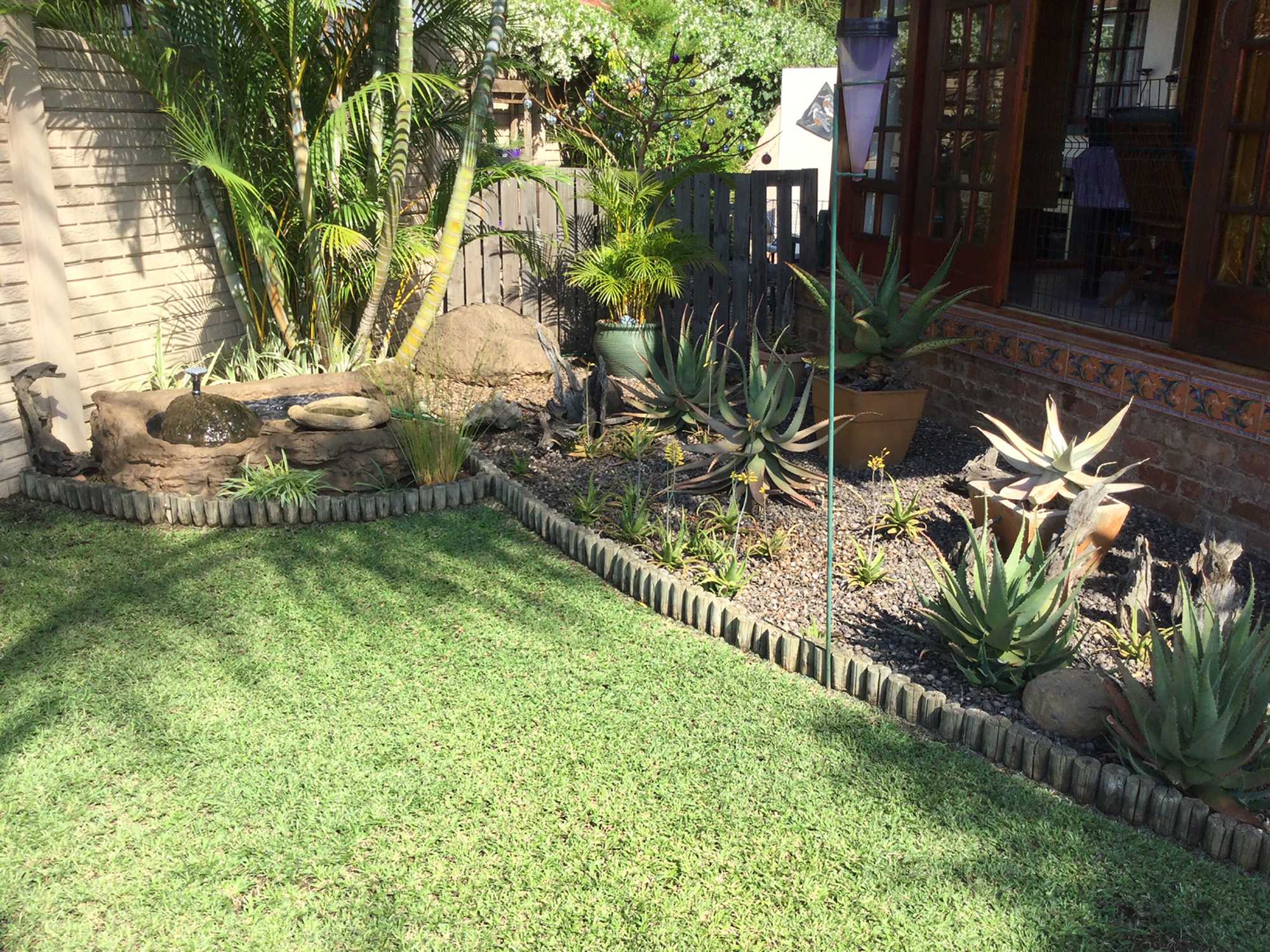 The Campbell’s have aloes in their garden which don’t need much water to survive. (Photo: Chris Campbell)
The Campbell’s have aloes in their garden which don’t need much water to survive. (Photo: Chris Campbell)
The Campbells also have a waterwise garden, with plants that don’t need a lot of water, such as two types of spekboom and aloes.
Similarly, Emmie Bedeker said all the water her household uses goes into the garden, where it waters a reed bush that is also used as a fence.
For her garden, Jacobs uses human urine as fertiliser. “An interesting YouTube video on using human urine as fertiliser led me to devise a little system to collect, dilute and apply urine to the garden,” she said. “A small routine that takes about five additional minutes a day. This immediately reduced the volume of water used to flush the toilet.”
 A solar geyser on top of the Campbell’s roof and two rain-catching drums. (Photo: Chris Campbell)
A solar geyser on top of the Campbell’s roof and two rain-catching drums. (Photo: Chris Campbell)
Chris Campbell said, “We collect rainwater from the roof, which then gets stored in rainwater tanks. When they are all full, we store the water in a 5,000-litre tank for household and garden use. In such a case, we disconnect from the municipal water supply. It also comes in handy during times when there is no municipal water available, which happens quite often.”
Klemp has a water collection system similar to the Campbells’ and said as a result he only buys a maximum of four kilolitres of water a year from the City of Cape Town.
Jacobs said, “some of the principles that I follow include doing the sniff test before laundering clothes. I spot clean where required and air the clothes.
“My laundry load is reduced to two per week for the household (no small kids or teenagers any more). Of course, the laundry is line dried.”
Jacobs added that her dry skin and eczema problems were resolved when she stopped daily full baths. She now does a “bird wash” in a basin of water daily, and only has full baths three times a week. All her bathwater is siphoned into the garden with a simple hosepipe method.
Doreen Musson says, “I shower once a day instead of twice as in the past. Water will replace oil as the cause of the next world war.”
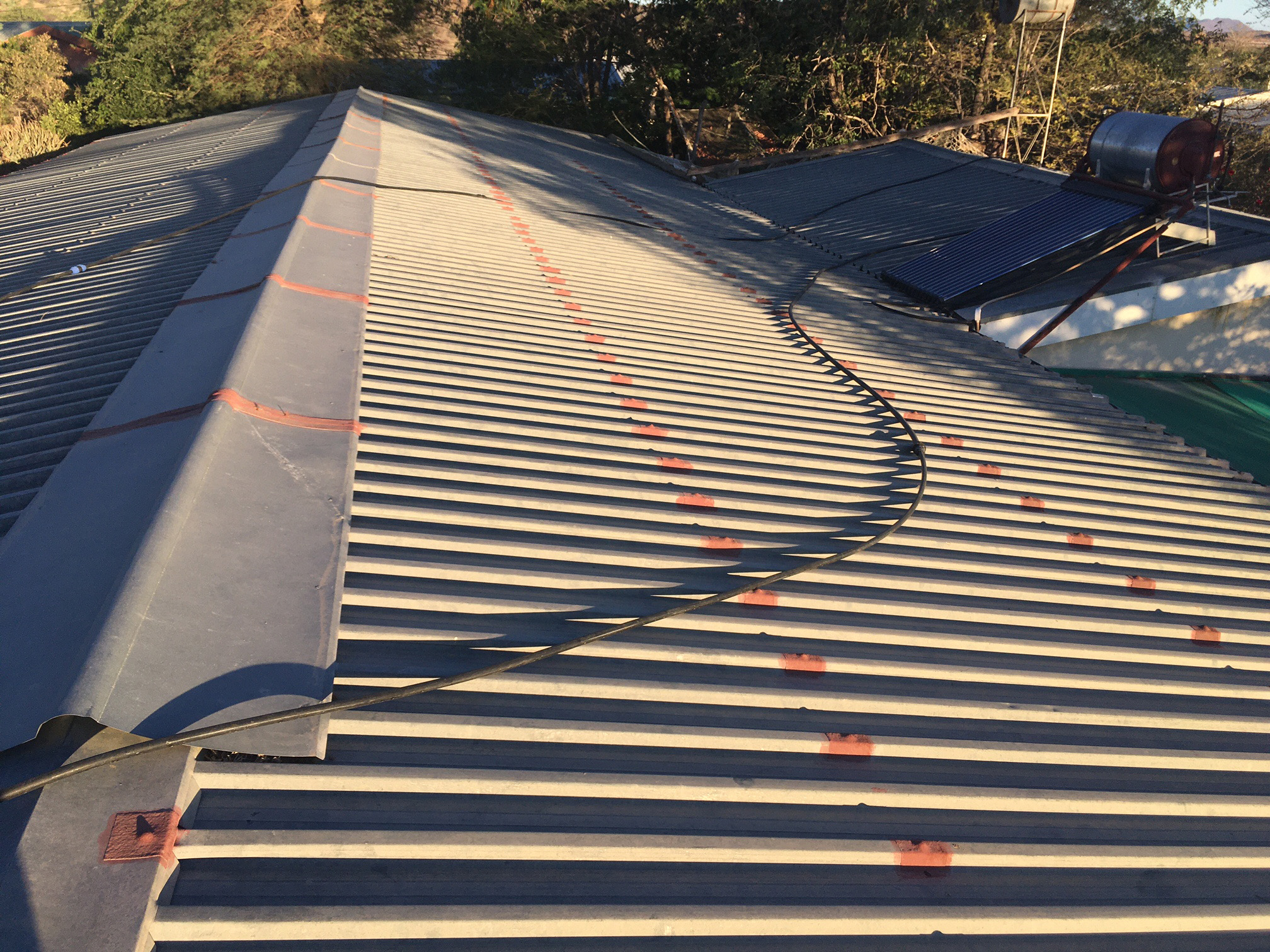 The Bedekers black 20m PVC pipe that snakes along the roof, ‘We connect it to the water system and the outdoor shower. Lovely to shower under trees with sunlight water,’ said Bedeker. (Photo: Emmie Bedeker)
The Bedekers black 20m PVC pipe that snakes along the roof, ‘We connect it to the water system and the outdoor shower. Lovely to shower under trees with sunlight water,’ said Bedeker. (Photo: Emmie Bedeker)
Like the other readers, Emmie Bedeker said her family shut down their electric geyser. “We put several metres of black PVC pipe on the roof and connected it to the water system and the outdoor shower,” she said. It’s lovely to shower under trees with sunlight water.”
Investments
After listing her efforts, Hamilton added, “My climate change issue is a far broader one — how does one identify ‘green’ investments?’
“I have just, for example, sold my few Tharisa shares because I do not want to be party to and benefit from the open-cast mining operation down the road from us.”
Marie-Louise Kellett, who has her honours in Environmental Science and is particularly interested in nature-based tourism said, “We need to be examining how our investments drive the crisis. For example, how many people have pension schemes and unit trusts with funds invested in companies that contribute to climate change and the destruction of natural ecosystems?
“They are most likely blissfully unaware that while they are diligently recycling at home, their pension fund is investing in fracking, for example.
Litter
 Samantha Choles’ poster she made in Grade 3, hanging in her office. ‘I’ve always been passionate about the environment. From a young age, I entered numerous poster competitions where the environment was the theme and I still have one of my Standard 1 (Grade 3) posters,’ said Choles. (Photo: Samantha Choles)
Samantha Choles’ poster she made in Grade 3, hanging in her office. ‘I’ve always been passionate about the environment. From a young age, I entered numerous poster competitions where the environment was the theme and I still have one of my Standard 1 (Grade 3) posters,’ said Choles. (Photo: Samantha Choles)
Samantha Choles, who runs a litter clean-up organisation, said, “I’ve always been passionate about the environment. From a young age, I entered numerous poster competitions where the environment was the theme and I still have one of my Standard 1 (Grade 3) posters hanging in my office.”
Choles explained that after collecting litter around her neighbourhood in Farrarmere, Benoni in 2015 for her 67 Minutes for Mandela, she realised it should become a regular thing, so she started Litter Bugs in 2015.
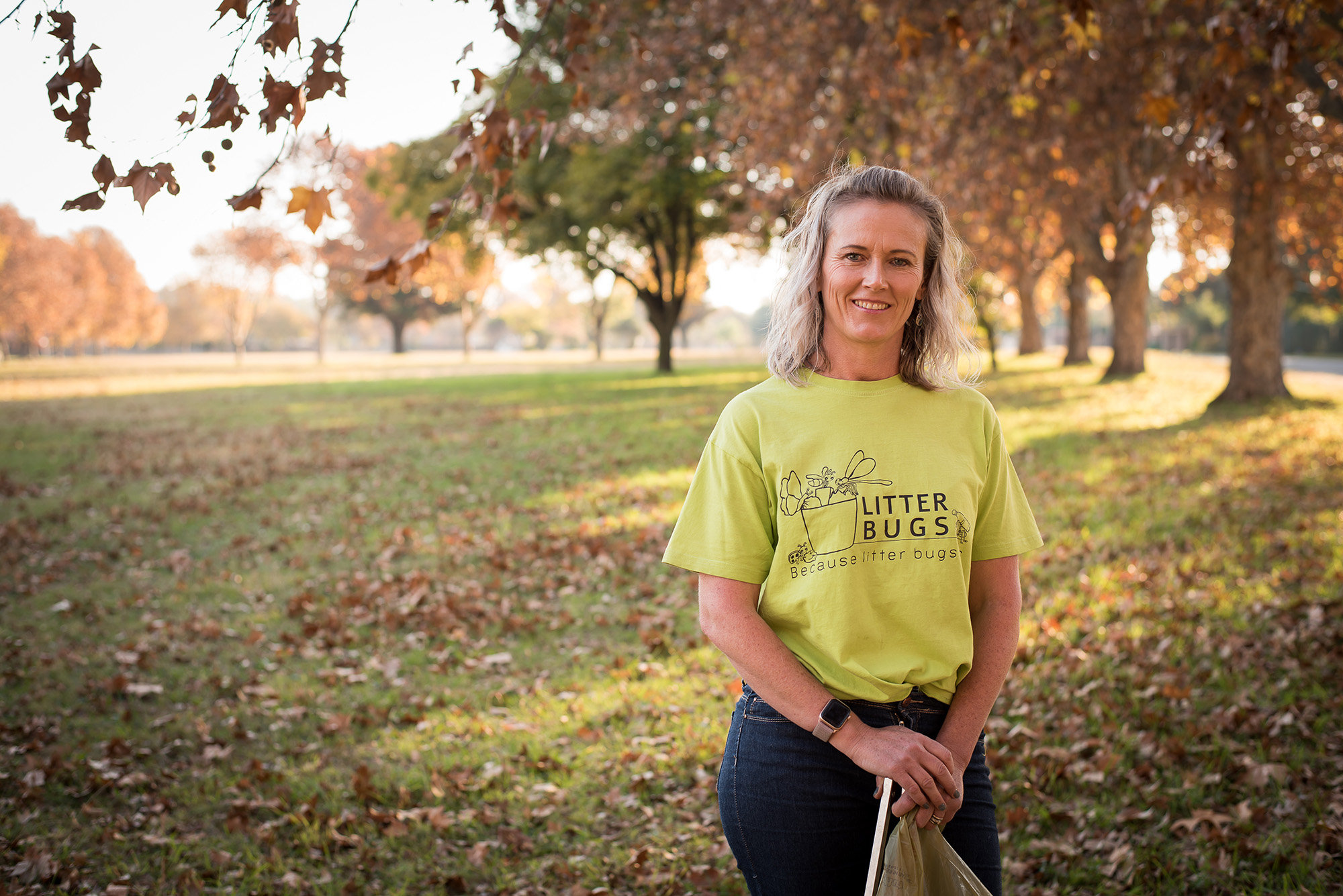 Samantha Choles started a volunteer organisation called ‘Litter Bugs’ in 2015 to help clean up her community in Benoni. (Photo: Natalie Gornall)
Samantha Choles started a volunteer organisation called ‘Litter Bugs’ in 2015 to help clean up her community in Benoni. (Photo: Natalie Gornall)
Choles, who also works as a communications specialist in the paper and paper packaging industry said, “the other elephant in the room is the education of our nation around littering.
“Signage reading ‘do not litter’ abounds, but does the average citizen know what litter is?” asks Choles. “Litter attracts litter — clean up first before we try to fix things that might not even be broken.
“Our streets, pavements and stormwater drains are a cesspool of rubbish.
“No matter the cost of the EPR levy or single-use tax, if we don’t teach people to use bins, make bins that work and ensure they are emptied, we are fighting a losing battle.”
Slow fashion
Bedeker said, “You do not need to buy new clothes every year. When I buy new clothes, I take some old ones and give them to someone who needs them.”
“It took a long time to establish my own style of dressing and determine which clothes have the quality characteristics that will give me years of wear,” said Jacobs.
“I used to go through my wardrobe regularly and donate what I could. I then realised that I was replacing clothes that I had been giving away. I am more discerning now about what I throw out. Some of my clothes have been with me for decades, especially items such as belts, bags and coats.”
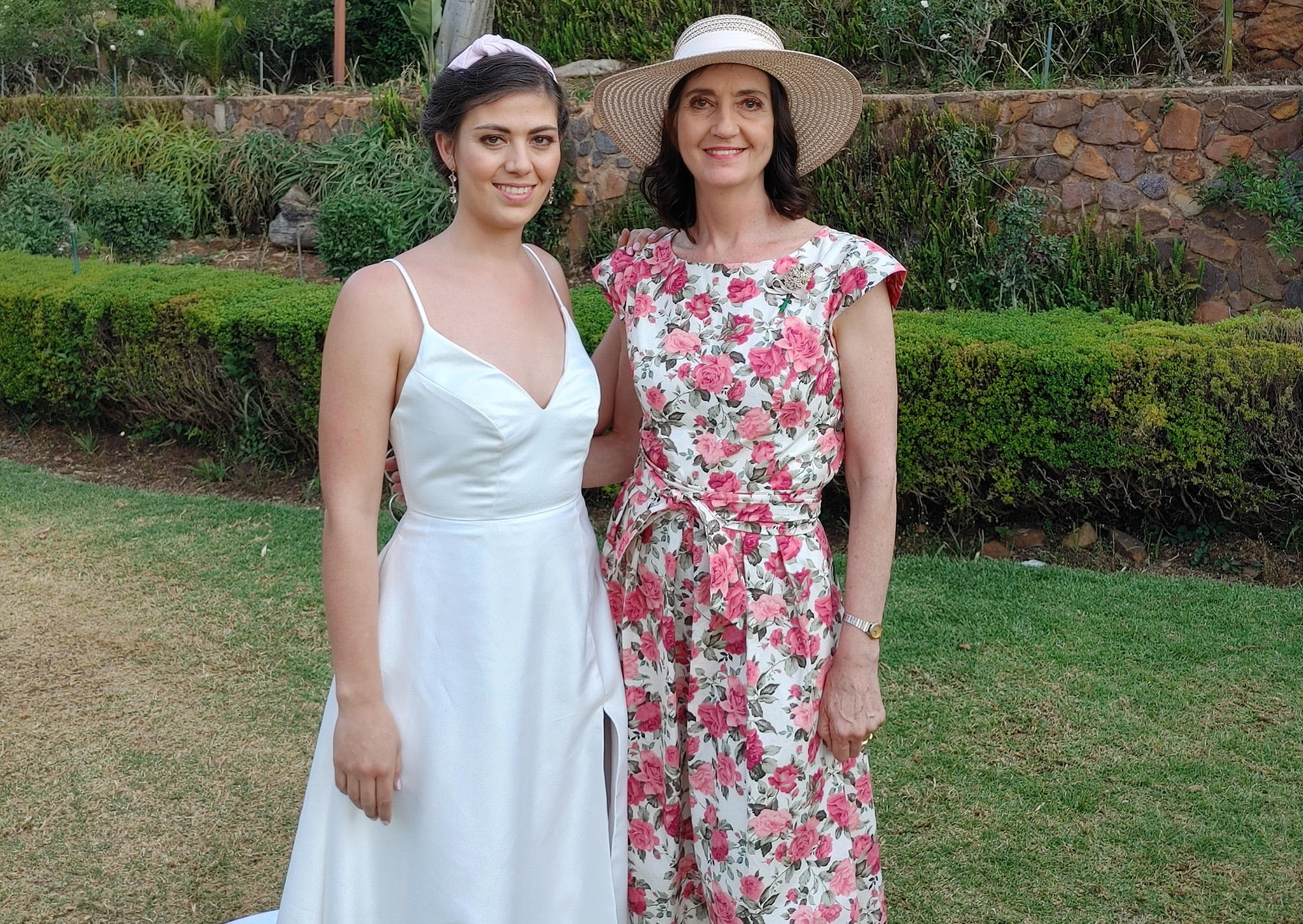 Lesley-Ann Jacobs (right) wears a dress she made using 100% cotton fabric at daughter Marike’s (left) spring morning garden wedding in September 2021. (Photo: Lesley-Ann Jacobs)
Lesley-Ann Jacobs (right) wears a dress she made using 100% cotton fabric at daughter Marike’s (left) spring morning garden wedding in September 2021. (Photo: Lesley-Ann Jacobs)
She also makes her own clothes. She made the dress she wore to her daughter’s wedding and sewed the skirt she used when she was a dietitian working in a provincial hospital.
“That goes back to pre-1988 and I still wear it,” she said. “These items come back into fashion or are so classic that they never go out of style.”
Waste
Lesley Ann Jacobs said, “I have been trying to implement zero-waste (or at least low-waste) principles in my household for several years. The result is that our waste bin is seldom more than quarter full and only put out for collection once or perhaps twice a month.”
Jacobs said her philosophy is to use what you have and reduce waste.
“My military medical career gave way to a career as a defence analyst,” she said. “That allowed me to learn more about war. I am fascinated by the social aspect of war, especially how women and children cope in wartime conditions.”
She learnt about the “family cloth” — squares of fabric used instead of toilet paper and washed with the usual load of laundry. “I have not yet progressed to using it for solids but quite happily wipe liquid waste,” says Jacobs, “[it] feels cleaner and is much softer on delicate tissue.”
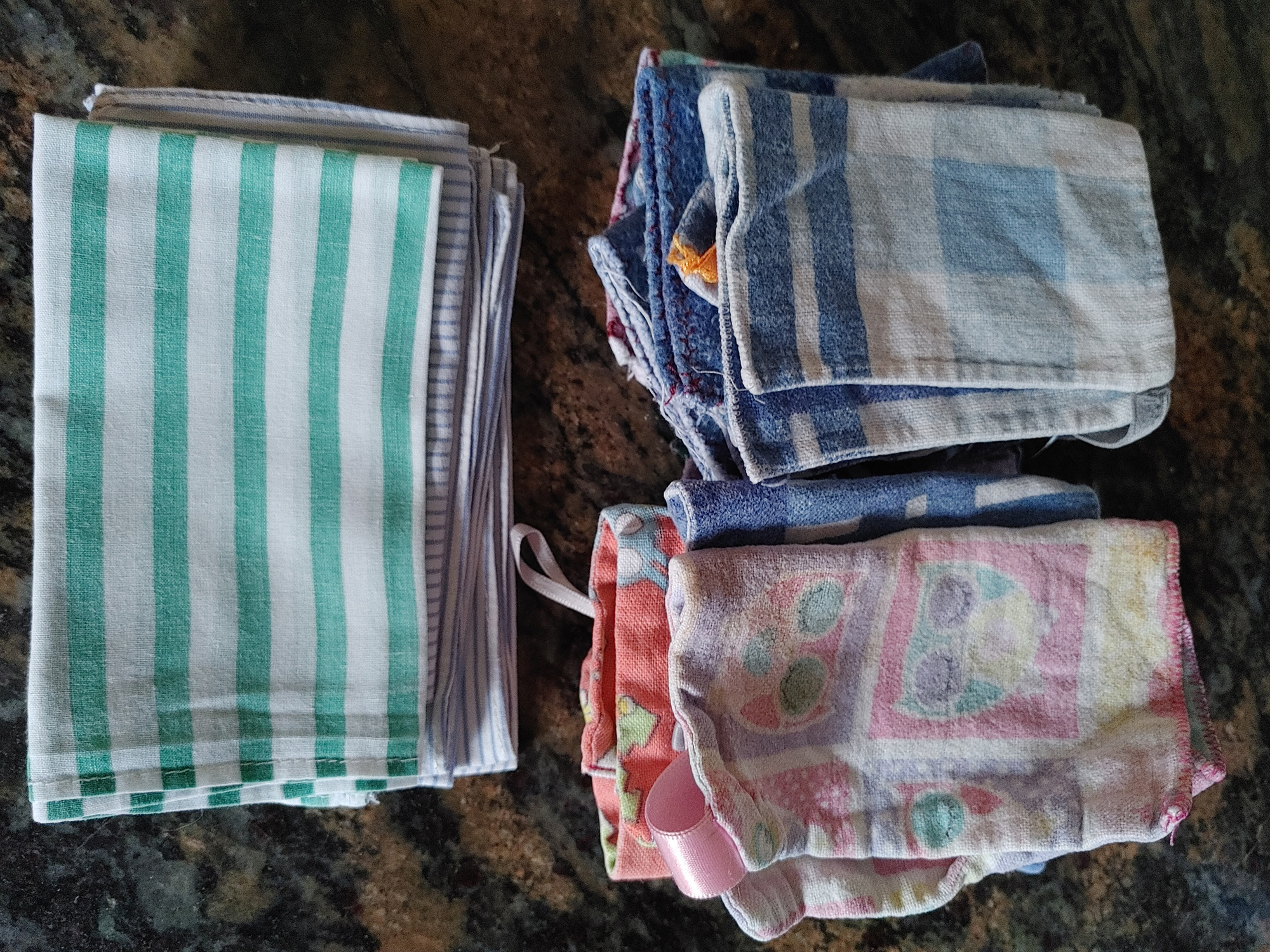 A stack of Lesley-Ann Jacob’s homemade hankies made with old pure cotton shirts and a stack of family cloth sewed from leftover pyjama fabric as well as a thrifted child’s pyjama top — 100% cotton flannel. (Photo: Lesley-Ann Jacobs)
A stack of Lesley-Ann Jacob’s homemade hankies made with old pure cotton shirts and a stack of family cloth sewed from leftover pyjama fabric as well as a thrifted child’s pyjama top — 100% cotton flannel. (Photo: Lesley-Ann Jacobs)
She added that all well-worn 100% cotton is used as hankies (as opposed to paper tissues) and once they’ve reached the end of their lifetime they are added to the compost heap to return to the soil.
Jacobs doesn’t use cling wrap, but covers her serving dishes with beeswax cloth.
“The main challenge is in one’s mind,” she said. ”I found that I had to change my mindset about things, such as not having a full bath every day or using the ‘family cloth.’
“Having spent most of my dietetic career in the military and having to do military training helped me understand that I could live with much less, including ablutions.
“We are so used to doing things in one way that it is difficult to imagine new ways.”
“I think it is all about attitude and principles,” said Bedeker. “To live simply, to know when enough is enough regarding things to have. To cook only enough food. Eat the leftovers the next day or give it to the chickens or dog. We really throw nothing away. We make our own compost and use the chicken droppings with it.”
Family involvement
Hamilton said her whole family is committed in various degrees to sustainable living.
Her sister, who lives just outside Malmesbury, is very much into permaculture and sustainable living and her brother, Gordon Smith, who lives near Plettenberg Bay, is off-grid and runs a seed swapping group
Her daughter Gill, who lives in Johannesburg, is heavily involved in a few climate mitigation NGOs, uses solar power and tries to live as sustainably as possible.
“This is something that evolved over years and my four kids grew up with some of the principles and practices,” said Jacobs. Her kids learnt to keep and wash bottles before taking them to recycling igloos and to reuse plastic bags and wrapping paper.
 Aluminium cans crushed and waiting to go to recycling. “This is the only one I get a few Rands for. The other stuff is collected by anti-waste,’ said Craig Campbell. (Photo: Chris Campbell)
Aluminium cans crushed and waiting to go to recycling. “This is the only one I get a few Rands for. The other stuff is collected by anti-waste,’ said Craig Campbell. (Photo: Chris Campbell)
“These things were and still are normal in our house,” said Jacobs. “My one son has now started a business in recycling — perhaps influenced by his mom! He has an organic vegetable garden at his house. And my daughter does exactly what I taught her as normal practice in her house. My youngest son is maintaining a minimal lifestyle, purely because he does not see the value in having a lot of stuff.”
Realising the importance of having an eco-conscious lifestyle
When asked what led them to lead such an eco-conscious and sustainable lifestyle, Jacobs answered, “I am not sure how I became aware of this.
“I grew up in a dysfunctional environment with many personal challenges, including money. I always knew I had to take care of what I had because it would not be replaced. I became aware of the environmental impact of human consumption and lifestyle later in my life.
“It was probably a combination of factors — my childhood years, observation about the ruinous behaviour of people, and information as I grew older.”
Chris Campbell said his awareness stemmed partly from the incompetence of government, of not being able to provide a constant supply of electricity and water, and their love of nature.
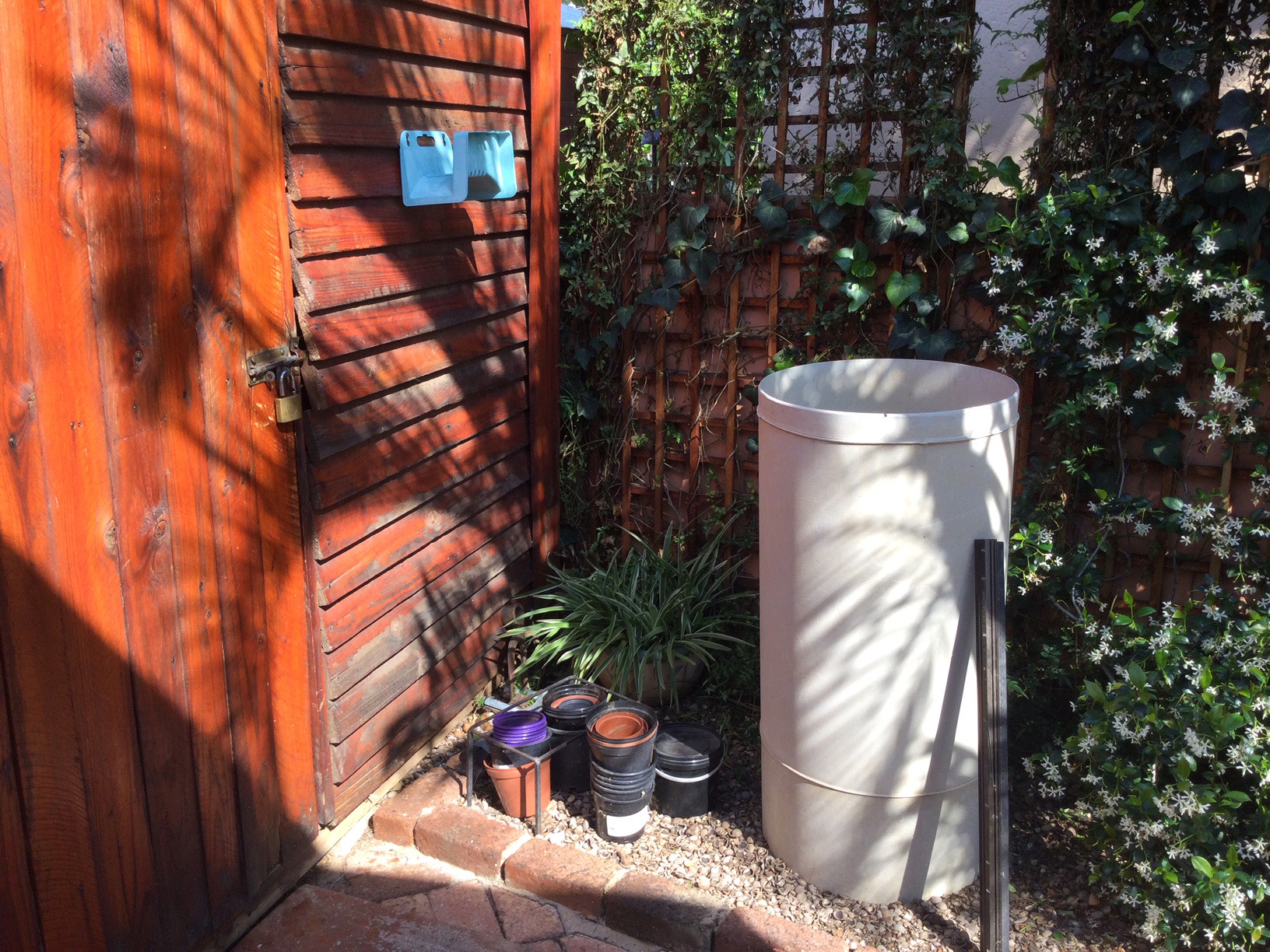 The Campbell’s compost bin and pots ready to go back to a nursery for reuse. (Photo: Chris Campbell)
The Campbell’s compost bin and pots ready to go back to a nursery for reuse. (Photo: Chris Campbell)
“We are bird watchers and are constantly aware of the effect of global climate changes,” explained Campbell. “I first became aware of environmental issues when I learnt about acid rain in high school in 1978.”
Marie-Louise Kellett said, “While we need to pay attention to the things we can do in our everyday lives, it is clear that the main drivers of the crisis are systemic, and that, using waste reduction as an example, reducing our waste on a personal level is not really going to make a difference.
“There are obviously other benefits to reducing our personal waste, mainly in the sense that it raises awareness of just how much waste is produced in our current economic system.
“But to truly make any significant impact on the crisis, we as individuals need to learn how to drive change at a systemic level.”
Kellet added, “we need to question the fundamentals of how we make decisions about everything, at all levels. The current model is not serving us well and we need a new approach.” DM/OBP
[hearken id="daily-maverick/8881"]




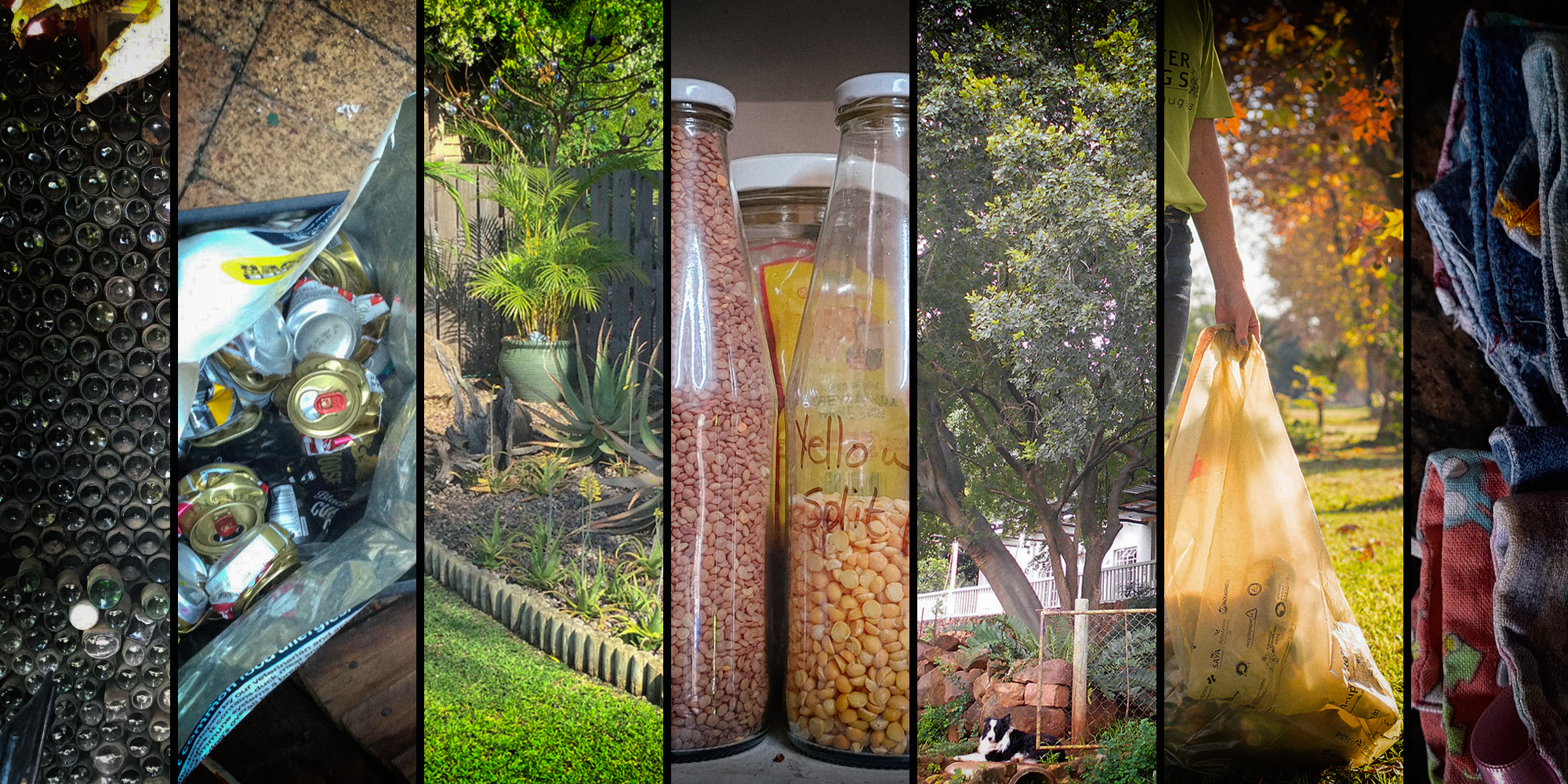 The Campbell’s compost bin and pots ready to go back to Greener Tidings nursery for reuse. (Photo: Chris Campbell)
The Campbell’s compost bin and pots ready to go back to Greener Tidings nursery for reuse. (Photo: Chris Campbell) 